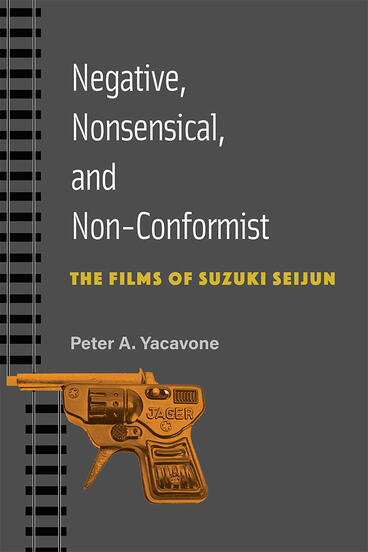Negative, Nonsensical, and Non-Conformist
The Films of Suzuki Seijun
The definitive study of the pathbreaking and controversial Japanese film director who expanded the form, rhetoric, and philosophy of popular genre movies
Description
In the late 1950s, Suzuki Seijun was an unknown, anxious low-ranking film director churning out so-called program pictures for Japan’s most successful movie studio, Nikkatsu. In the early 1960s, he met with modest success in directing popular movies about yakuza gangsters and mild exploitation films featuring prostitutes and teenage rebels. In this book, Peter A. Yacavone argues that Suzuki became an unlikely cinematic rebel and, with hindsight, one of the most important voices in the global cinema of the 1960s. Working from within the studio system, Suzuki almost single-handedly rejected the restrictive filmmaking norms of the postwar period and expanded the form and language of popular cinema. This artistic rebellion proved costly when Suzuki was fired in 1967 and virtually blacklisted by the studios, but Suzuki returned triumphantly to the scene of world cinema in the 1980s and 1990s with a series of critically celebrated, avant-garde tales of the supernatural and the uncanny. This book provides a well-informed, philosophically oriented analysis of Suzuki’s 49 feature films.
Peter A. Yacavone is Associate Professor of English at Shanghai International Studies University.
Reviews
“Fans, aficionados and, yes, even scholars will treasure this long-awaited study of the work of one of Japan’s greatest, and most wonderfully eccentric, directors. Yacavone demonstrates the startling originality of Suzuki’s cinema and continuity of his vision—a genuine auteur study that does not ignore other factors, like genre, industry, and social context.”
- David Desser
—David Desser, Emeritus University of Illinois at Urbana–Champaign
“This is an excellent, passionate study that illuminates Suzuki’s work in its broad features as well as its nuances and striking idiosyncrasies. Yacavone develops an analytic template that he terms the ‘Suzuki Difference’ which deals with the manifold ways that Suzuki challenged, subverted, undercut, and blithely disregarded the norms of professional studio filmmaking that bound most other filmmakers in the period.”
- Stephen Prince
—Stephen Prince, Virginia Tech

